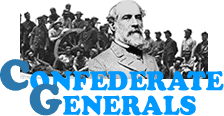|
Felix Kirk Zollicoffer was born in Maury, Tennessee, on May 19, 1812. As a young man, he worked on his family's plantation, then attended Jackson College in Columbia, Tennessee, for one year. Becoming interested in the newspaper business, Zollicoffer joined a newspaper in Paris, Tennessee, at the age of sixteen. Within two years, he was working as a journeyman printer in Knoxville, later editing the Columbia "Observer" and helping edit the "Southern Agriculturist," as well as the Huntsville, Alabama "Mercury." Zollicoffer was named state printer in 1835, then joined the Tennessee Volunteers as a lieutenant during the Second Seminole War. In 1842, he was associate editor of the Nashville "Republican Banner," a major Whig paper. After serving as state adjutant general and comptroller from 1846 to 1849 and as state senator from 1849 to 1852, he helped the successful gubernatorial campaign of William B. Campbell. In 1852, he supported the Whig campaign of presidential candidate Gen. Winfield Scott, as well as gaining election to the U.S. House of Representatives. During the campaign, however, Zollicoffer fought in a duel with the editor of the Nashville Union. As a supporter of states rights, he tried to negotiate for peace when sectional tensions arose. Remaining in Congress until 1859, he supported John Bell's campaign for the presidency and attended the Washington Peace Conference in 1861. Once Tennessee seceded, however, Zollicoffer became a brigadier general of state troops, and accepted a brigadier general's commission in the Provisional Confederate Army. Initially ordered to East Tennessee, he moved into Kentucky and crossed the Cumberland River. Encamped with the river behind it, Zollicoffer's small group of troops was poorly positioned when Maj. Gen. George B. Crittenden arrived. Union forces advanced, and the Confederate forces attacked the Union troops at Mill Springs. Although he was extremely near-sighted, Zollicoffer rode in advance and was killed by a Union volley on January 19, 1862. His body was sent back to Nashville and buried in the city cemetery.
|

